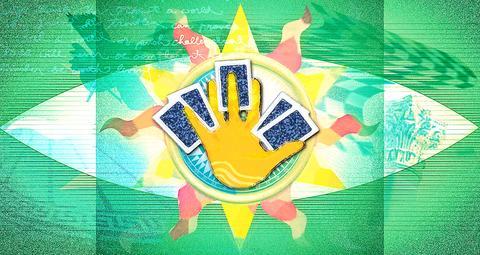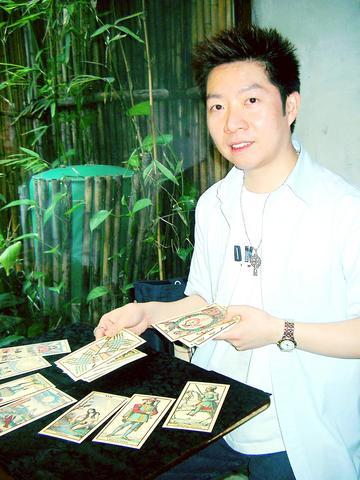Well-known TV anchor Chang Ya-chin (張雅琴) is on set and sits at a counter decorated with mystical symbols, asking Maurice (whose surname is Chen but he prefers his stage name), "so what do you see happening in the next Taipei mayoral election?" Maurice picks one card from a dozen cards spread out on the table and takes a look. Within seconds he's pontificating.
"Well, this is a tough one. The card refers to waiting, and uncertainty. This means Ma Ying-jeou (

The next question is: "Can you analyze these four people? Lien Chan (

PHOTO: YU SEN-LUN, TAIPEI TIMES
Tarot card reading used to make waves in publishing and TV media about five years ago when it was introduced to Taiwan. But horoscopes, Chinese divination and the Eight Diagrams are still the major tools of fortune-telling in popular culture today. Now, 30-something Maurice -- who is seen as a bit of a wizard in celebrity circles in both China and Taiwan -- is about to change all that.
Asia Plus (東風衛視) -- a satellite TV channel in Taiwan, Hong Kong and China that broadcasts Chang's Inside Copy (
Fortune-telling programs have become popular on Taiwan's cable channels. They usually follow a talk-show-like format, with two hosts chatting to one or two fortune tellers. Such shows cost little to produce and most of this money goes to the "experts."
On Eastern TV channel (東森電視), there are two popular fortune-telling shows. Lucky Strike(開運鑑定團), airs five days a week and Match Wonderland (友好星樂園) goes out once a week. The former has a rating of 1.12 percent, a success for cable TV programs. The popularity of fortune telling has also got Asia Plus interested in producing similar programs.
"Indeed, fortune telling is now a hot topic among audiences. And now we are planning a new fortune-telling show for Maurice," said Joshua Shao (
"He's so good at it, like he's got a gift. He can sense something normal people can't," said Akai Wu (
"It's magical when you see him reading for others. He can sense the person's magnetic field within a few seconds. And from one single card, you can probably read many different things. But Maurice can see something totally related to that person," Wu said.
"One time, a girl came to him asking about her boyfriend," Wu said. "But Maurice read that it was a love triangle. The girl finally admitted that she was the third party," Wu said.
Winston Chao, the actor best-known for his role as Sun Yat-sen in The Soong Sisters, has now shifted his career focus to China.
"I don't usually believe in horoscopes or tarot cards. So I asked Maurice which of three TV dramas I was to star in would be a success. He picked the one I did not expect to be good. And that turned out to be one of the best-selling dramas on Central Television Station in China," Chao said.
One of the reasons Maurice is so popular among Chinese
celebrities is, perhaps, because he has a Chinese way of reading tarot cards.
"When it comes to psychic reading or fortune-telling, Chinese people tend to be very utilitarian. They want practical answers, very clear-cut, black-and-white solutions. They're not interested in knowing about their egos or understanding more about their own psyche," Maurice said.
Some of Maurice's clients ask detailed questions about their investments. "I need to tell them how many US dollars and how many euros the client should buy. Or, how much he should invest in a new projects or whether he should buy new stock, and when he should put the money in," Maurice said.
Maurice said he hadn't set out to be a fortune teller.
"My first deck of tarot cards were bought from a New Age bookstore in New York 10 years ago. It was just for fun," he said. Maurice was at the time working as a visual arts consultant for the New York City Ballet. He also became the assistant for Tibetan expert and religion professor Jeffery Hopkins at the University of Virginia.
"From the time I began reading cards for friends, the response was very positive. Then I tried to prophecy the US presidential election. It was when Clinton won again, , as my reading suggested, that I began to become more confident about my abilities," he said.
Maurice began charging people three years after he taught himself to read the cards and in two months he had 200 clients. He later studied at Findlay College in London, the school famous for studying mysticism.
"[The clients] were mostly in the entertainment business, asking about relationships. There were also record company executives asking when they should set the release date for their records and whether they should spend more money on marketing?" Maurice said.
Though Maurice would not confirm the cost of his readings, in the early stages of his career he charged NT$5,000 for a question, with a session lasting up to 40 minutes. Prices went up when he began his business in Beijing.
"RMB10,000 (US$1,200) for a question is a rock-bottom charge for him," said agent Wu. "Compared with many so-called fortune-telling "masters" in Beijing, Maurice's price is very reasonable," he said. "Some masters even ask their clients to give a red envelope when their son is getting married, or when the master's family is moving."
"He has the gift. And the contents of his readings are very solid," said Peter Dernbach, of legal firm Winkler Partners, who has known Maurice as a friend since his college years.
"I would not probably pay that much for a tarot card reading. But the value of such a reading lies in the hearts of the person asking. They are willing to pay because they think it's helpful for them," Dernbach said. "Besides, Maurice is a very balanced person. He knows what he can do or what he can't."
Now, Maurice is ready to host his own TV show.
Those who are curious about Maurice's readings but cannot afford his high prices, the new TV show sounds like a good idea.

April 14 to April 20 In March 1947, Sising Katadrepan urged the government to drop the “high mountain people” (高山族) designation for Indigenous Taiwanese and refer to them as “Taiwan people” (台灣族). He considered the term derogatory, arguing that it made them sound like animals. The Taiwan Provincial Government agreed to stop using the term, stating that Indigenous Taiwanese suffered all sorts of discrimination and oppression under the Japanese and were forced to live in the mountains as outsiders to society. Now, under the new regime, they would be seen as equals, thus they should be henceforth

Last week, the the National Immigration Agency (NIA) told the legislature that more than 10,000 naturalized Taiwanese citizens from the People’s Republic of China (PRC) risked having their citizenship revoked if they failed to provide proof that they had renounced their Chinese household registration within the next three months. Renunciation is required under the Act Governing Relations Between the People of the Taiwan Area and the Mainland Area (臺灣地區與大陸地區人民關係條例), as amended in 2004, though it was only a legal requirement after 2000. Prior to that, it had been only an administrative requirement since the Nationality Act (國籍法) was established in

Three big changes have transformed the landscape of Taiwan’s local patronage factions: Increasing Democratic Progressive Party (DPP) involvement, rising new factions and the Chinese Nationalist Party’s (KMT) significantly weakened control. GREEN FACTIONS It is said that “south of the Zhuoshui River (濁水溪), there is no blue-green divide,” meaning that from Yunlin County south there is no difference between KMT and DPP politicians. This is not always true, but there is more than a grain of truth to it. Traditionally, DPP factions are viewed as national entities, with their primary function to secure plum positions in the party and government. This is not unusual

US President Donald Trump’s bid to take back control of the Panama Canal has put his counterpart Jose Raul Mulino in a difficult position and revived fears in the Central American country that US military bases will return. After Trump vowed to reclaim the interoceanic waterway from Chinese influence, US Defense Secretary Pete Hegseth signed an agreement with the Mulino administration last week for the US to deploy troops in areas adjacent to the canal. For more than two decades, after handing over control of the strategically vital waterway to Panama in 1999 and dismantling the bases that protected it, Washington has